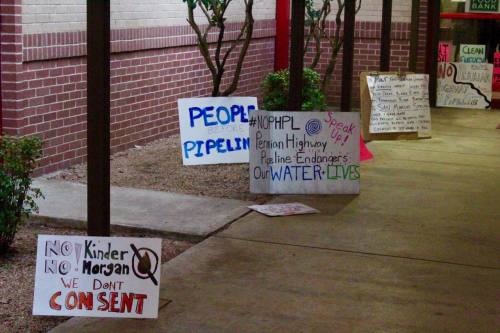Hays County and Kyle sign on to join stakeholders in legal action against Kinder Morgan’s Permian Highway Pipeline
Residents expressed opposition to the pipeline at a Feb. 13 community meeting held at Wallace Middle School.
In the midst of growing regional outcry against Kinder Morgan’s proposed Permian Highway Pipeline, Hays County and the city of Kyle on April 16 officially decided to take the battle over the proposed pipeline route to the courtroom.
Both the Hays County Commissioners Court and Kyle City Council unanimously voted at their meetings Tuesday to enter into an agreement with Richards, Rodriguez & Skeith LLP and the legal office of Max Renea Hicks for legal representation in filing suit against Kinder Morgan and the Texas Railroad Commission in relation to the Permian Highway Pipeline.
Local representatives have been publicly discussing opposition to the planned 430-mile, $2 billion natural gas pipeline for several months. Kinder Morgan’s proposed route more or less bisects Hays County and will affect 82 local landowners.
“None of the decisions that this court makes are done lightly,” said Commissioner Walt Smith at the Commissioners Court meeting. “The one thing we wanted to ensure to our citizenry, along with ourselves, is that we felt like the options that were out there were being pursued and that we were doing our due diligence before any decision was made.”
Smith said following several meetings with trade associations and others familiar with the pipeline issue at the state capital in regard to potential implications of this sort of litigation, he feels “very comfortable” with the county’s decision.
Both Kyle and Hays County officials noted that taxpayers are not funding legal action against Kinder Morgan, which is being paid for by another group that is part of the agreement: the Texas Real Estate Advocacy and Defense Coalition.
In addition to the TREAD Coalition, Kyle and Hays County, parties named in the agreement for legal representation include the law firm Braun & Gresham; local landowners Scott and Lana Nance; and Andrew Sansom, a well-known conservationist.
David Braun of Braun & Gresham spoke at Kyle City Council.
“TREAD is very enthusiastic about having the city and Hays County join with lawmakers to raise objection to this really unfortunate route that Kinder Morgan has decided to put through our community.”
The Kyle agreement stipulates that the named lawyers will represent the group in disputes “regarding and involving them and the state of Texas, the Texas Railroad Commission and Kinder Morgan” over issues “including but not limited to the claims regarding the constitutionality of private pipeline eminent domain authority.” (Read the full agreement here.)
Asked for additional clarification at the Kyle City Council meeting, City Attorney Paige Saenz added, “The basis of the lawsuit relates to the processes and procedures used by the Railroad Commission to authorize those types of pipelines.”
Oil and gas pipeline companies in Texas historically have been afforded the power of eminent domain, which means that as long as landowners are compensated, their land can be taken even if they do not want to sell it. That authority—stemming from a provision in the state constitution and delegated by the legislature—dates back to the building of the railroads, which were considered “common carriers” undertaking projects for the public benefit.
“Giving private entities the right of eminent domain is very tricky,” Commissioner Lon Shell said. “And in the state of Texas right now I don’t believe there’s safeguards in place to make sure that they do the things that we do as a county when we use eminent domain.”
Shell added that while he recognizes the importance of the oil and gas industry to the state’s economy, he believes the state could do better at protecting property rights from private entities.
“This isn’t a shot at the oil and gas industry; this isn’t trying to get in the way of the jobs that are created there and some of the benefits,” Shell said. “This is about property rights—specifically of our citizens, but [also] citizens across the state of Texas. And I believe Texas can do better than what we are doing right now with regards to these types of projects, and that’s what this is about to me.”
To build the pipeline, what Kinder Morgan needs from landowners along the route is a 50-foot permanent easement for the actual pipeline and a temporary 75-foot easement for construction.
Shell said he hopes the county’s decision to join a lawsuit against Kinder Morgan could lead to an outcome that may, in his opinion, improve the way the state grants the power of eminent domain while better respecting property rights.
“[Eminent domain is] a very serious power and I just think we need a better process,” Shell said. “That’s why I believe this is necessary and I don’t think we have an option right now. Hopefully good things can come from this. We’re still going to adapt and do everything we can for our citizens but I believe that right now this is what’s necessary.”
There are several bills currently moving through the state legislature that, if passed, would mandate increased oversight of pipelines and could limit the power of pipeline companies to use eminent domain. But Kyle Mayor Travis Mitchell said the city and county feel it’s important to act.
“This suit the city of Kyle is undertaking was not taken lightly. We did a lot of research and we appreciate the county, as well, having the courage to move forward,” Mitchell said. “We all believe this is in the best interest of our community, and so we wish you Godspeed.”




